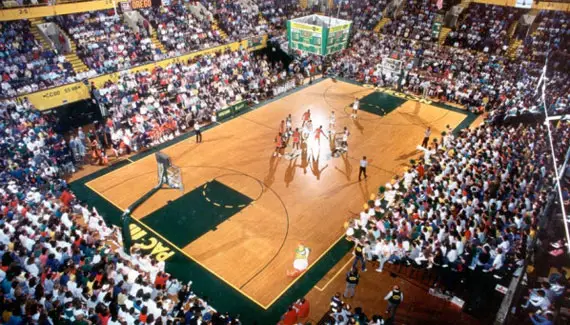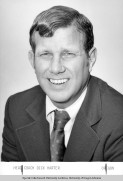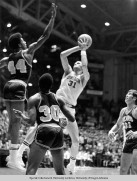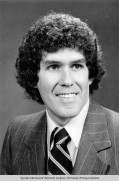For a school that boasts an NCAA title and two Elite Eight appearances this century, its noteworthy that its teams from nearly four decades ago would remain arguably the most memorable and popular in program history. The “Kamikaze Kids” are legends at Oregon, as is the man who led them: Dick Harter.
Harter’s arrival at Oregon can be traced back to previous head basketball coach Steve Belko deciding to step down at the end of the 1970-71 season. Belko’s last team had finished 17-9, but missed the postseason.
Oregon’s search for a new coach would take them to the East Coast. There they found Dick Harter who, at the time, was the head coach of the University of Pennsylvania. Harter’s Quaker teams were coming off back-to-back seasons of 20 or more wins and NCAA tourney appearances. However, Harter was frustrated with recruiting limitations. Penn would only give scholarships based on financial need, which limited their ability to recruit the best players.
Seeking greener pastures, Harter accepted Oregon’s offer, which included a considerable increase in salary. Harter was also able to extract promises of an increased recruiting budget, increased staff and a new suite of offices, which one reporter described as among the nicest in the country.
Harter’s stated reason for coming to Oregon was to win a national championship. He felt that Eugene was the best place to do that as the Pac-8 was then considered one of the strongest basketball conferences in the United States.
When Harter arrived in Eugene he found that Belko had left the cupboard relatively bare in terms of talent. Gone from the 1970-71 team were Stan Love, Bill Drozdiak and Larry Holliday. Harter inherited two starters, guard Ken Strand and forward Rusty Blair, and two lettermen, center/forward Doug “Cowboy” Little and guard Clyde Crawford — who would be lost to to a knee injury prior to the 1971-72 season.
Given the lack of experience and talent on Harter’s first Ducks team it was not surprising that Oregon finished with a losing record (6-20). What came as a shock was that the Ducks lost every conference game that season (o-14). The final loss of that season would be to Oregon State, in Corvallis.
During the closing seconds of that game, a male member of the OSU rally squad seized the microphone and proceeded to “congratulate” the Ducks for being the first team in Pac-8 history to lose every conference game. That did not sit well with Harter. What that cheerleader was overlooking was the fact that two of Oregon’s six wins had been at the Beaver’s expense with back-to-back victories in January and February. Apparently, these two games didn’t count.
Still, Harter was laying the foundation for the teams that would become known as the Kamikaze Kids. From that first team would come Little, forward Billy Ingram, guard Paul Halupa, forward Kim Swaim and forward Paul Sunderland.
That year’s freshman team (freshmen were not eligible for varsity at the time) included future Kamikazes guard Dean Roberts, guard Bert Frederickson, forward Ken Stringer, center Gerald Willett and forward George Martin.
After his sophomore season with the basketball team, Martin would go on to achieve renown on the football field for the Ducks and the New York Giants. Willett would be one of only two players from the state of Oregon to play for Harter.
Not all of the players on that first season’s roster or freshman team would remain for the 1972-73 season. Harter was notorious for the demanding practices that he ran, some of which would last as long as four hours. Players were required to participate in charge drill, practice diving on the floor after loose balls, slide drills with bricks in each hand, climbing a rope to the top of McArthur Court – ”The Pit” — and running “17s” — wind sprints the width of the court.
Sometimes players would throw-up from the exertion. For this reason, Harter had 5-gallon buckets placed under each basket. Most players stuck with the practices, but hated them. They will also acknowledge today that the hard practices helped them later in life.

Ronnie Lee
Courtesy University of Oregon Libraries, Special Collections & University Archives
It was to be expected that these practices and Harter’s coaching style would not be for everyone. While a few players quit for that reason, most players who left the team did so for a variety of other reasons, including academics, injuries, lack of playing time and loss of interest.
The 1972-73 squad would be Harter’s first winning team at Oregon, finishing 16-10. This would also be the year in which their nickname Kamikaze Kids was coined. One of the decisions made that season by the Pac-8 conference was to allow teams other than its champion to play in postseason tournaments, including the National Invitational Tournament (NIT). Oregon would not benefit from that change until the 1974-75 season.
On the heals of their successful 1972-73 season, the 1973-74 team finished with only one additional loss (15-11). That campaign ended on a note of controversy. As the final game with OSU wound down to its last seconds, one of the Beavers’ cheerleaders ran around the court holding aloft the Chancellors Trophy.
That person made the mistake of running in front of the Oregon bench. Harter slid his foot out and tripped the cheerleader. The Chancellors Trophy was dented and Harter was not exactly apologetic following the incident. However, it was the 1972 and 1973 recruiting classes that provided the core of the teams that went on to three straight NIT tournaments.
Following the 1974-75 season the Ducks made their first and most successful appearance in the NIT, finishing third. This season also marked Harter’s best record at Oregon (21-9). Return visits would be made to the NIT following the 1975-76 season (19-11) and 1976-1977 season (19-10).

Stu Jackson
By this time most of the players from the 1972 and 1973 recruiting classes were gone. The recruiting classes of 1974, 1975 and 1976 failed to produce many players who contributed significantly, and clearly had no superstars like Ronnie Lee or Greg Ballard. It was to be Harter’s final recruiting class in 1977 that was considered to be as good or better than the 1972 and 1973 classes.
Oregon opened the 1977-78 season with hopes of finally making it to the NCAA tournament. Unfortunately, they would slide backward finishing 16-11 with no tournament bid. What had happened? There were a number of factors, but it seems the two biggest of those were the failure to find five players who could be consistently productive and the disappointing play of the freshmen.
As the season wore on the fans started getting restless. There were expectations that the Ducks should have gotten to the NCAA tournament by now. That disappointment was further aggravated by the dismissal of forward Joe Moreck, one of the team’s veterans, for missing practice. Many fans were not happy with Harter’s decision.
It was not long after this that Harter began looking for another job. In March 1978, Harter was reported to be Penn State’s top candidate to become its new head coach. This was not the first time that Harter had considered leaving Oregon. In April 1976, shortly before letter of intent day, Harter interviewed with Colorado for their head coaching position. He did not take the job but it may well have hurt his 1976 recruiting class that yielded just one player that would spend more than one year in Eugene, John Murray.
Harter was definitely serious about the Penn State job even though he was the highest paid coach in the Pac-8, had the largest recruiting budget and had just completed the first year of a five year contract. He was finally offered the Penn State job only to say he was staying at Oregon – just as he left on a recruiting trip.
For whatever reason, a week later Harter chose to take the position at Penn State, despite a late night call from his five freshman players asking that he stay and where Harter agreed to do so. There surely was a sense of betrayal on the part of those freshmen. Longtime assistant Jim Haney would be named Harter’s successor.
What were Harter’s reasons for leaving? Perhaps we will never know. One reason was to be back in his home state of Pennsylvania. Another would be closer proximity to his recruiting base in the East and Midwest. Harter only rarely recruited in California and never in Oregon.
He would never achieve his goal of a national championship at Penn State. While he did manage a winning record they had only one NIT tournament appearance. Harter would remain at Penn State through the 1982-83 season, leaving for a long career in the NBA, something he had said in 1973 he never wanted to do.
Perhaps it was because he knew his next Penn State team would not be very good. That team was 5-22. Maybe Harter had also realized that Oregon’s 1978-79 team would probably have a losing record, as well (12-15).
The Dick Harter era overall had been a successful one for Oregon with only one losing season and three tournament appearances. It would not be until Don Monson’s first season that Oregon would have another winning season. Ok, now that you know the history, lets get back to the Kamikaze Kids. Tomorrow’s article, The Rise and Fall of the Kamikaze Kids, will explain who exactly they were, where the nickname came from and how they earned it.
Top photo by ©University of Oregon Libraries – Special Collections and University Archives
Jim currently resides in Ellensburg, Washington where he has had the opportunity to watch former Ducks such as NaDerris Ward and Scott Grady play for Central Washington University, Jim’s alma mater. However, Jim was born in Eugene and attended Howard Elementary School, and what then called Colin Kelly Junior High School before moving to Washington. Jim began following the Ducks during the 1957 season and had the opportunity to watch a number of games at Hayward Field. Over the years, Jim has developed a wealth of knowledge about Oregon sports history. When not editing on Fanbase.com or working in his garden, Jim manages to find time to practice law.




